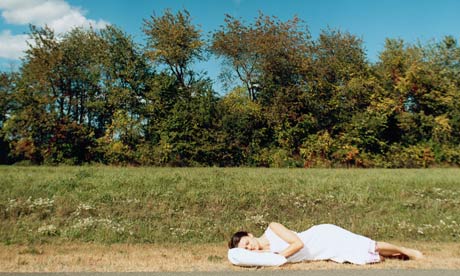
Feeling knackered? Not getting enough sleep? You're not the only one. The Great British Sleep Survey shows some 51% of us are not getting enough shut-eye. And, according to Professor Colin Espie of Glasgow University, who commissioned the report, this points to a "real medical issue that should be taken seriously", as insomnia has knock-on health effects and the NHS ought to be providing Cognitive Behavioural Therapy to treat it.
You might also reckon that people's sleep patterns would be getting worse as anxiety about job security and the economy increases during the recession. In which case, how do you account for the 2002 report, from the US National Sleep Foundation, which found that 75% of Americans had trouble sleeping?
Insomnia isn't a new phenomenon. There was no mystical time in the past when everyone got a good eight hours' sleep a night and woke up refreshed. In fact the notion of eight hours as a norm is a myth in itself; there is no evidence that people need that much to function properly. The statistical average for the UK is just over seven hours.
Nor can you necessarily rely on people to report their sleeping patterns accurately. Most people wake up thinking they haven't had as much sleep as they would have liked – or needed – and most tend to underestimate the time they have slept. Which isn't to say that people aren't suffering from sleep deprivation and that it doesn't have serious repercussions. It's just that you have to be sure about what is being measured and not misled by headlines.
I've been an insomniac for years and years. Whereas some people can't get to sleep, my trouble is I can't stay asleep. I crash out quickly when I get into bed but am frequently wide awake at 4am and unable to get back to sleep. How to interpret that pattern is another matter.
Could I be a Margaret Thatcher who only needed five hours asleep? I sincerely hope not, but you never know. Could it be that I am depressed? Mmm. That's tricky. Sometimes I am and sometimes I'm not. I've had enough episodes of clinical depression to know the difference between being catatonic and a bit down. Does not sleeping make me anxious? Er … sometimes it does and I fret about not getting enough sleep and get into a right state; and sometimes I'm really not bothered and just get up and read. Does it make me less productive at work? I'm not sure. How do you benchmark productivity and factor out all other variants?
The point is that while my insomnia is fairly constant, my tolerance to it varies. And I would guess that's the same with most people, with everyone having different stress and breaking points. And that's before we address the statistic that 75% of those reporting insomnia are women. Why is that? Could it be, as Professor Jim Horne of Loughborough University has proposed, that women's brains are structured differently to men and require more sleep? Or could it be that women are still conditioned to be the prime child carers and their sleep patterns never really recover from being woken up umpteen times a night by their babies?
So, interesting as it might be to have it reconfirmed that more than half the country isn't sleeping very well, we're still a long way off understanding just what the implications of that finding are. Or what to do about it.

